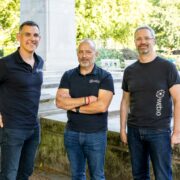Podcast Ep 114: Justin Lawless reveals how Louth software business Intact Software’s growth story eloquently captures the history and the growth imperative of Ireland’s indigenous software sector.
Way back in the early 1990s when most business people were still using DOS (disk operating system) computers to manager their accounts, an accountant called Paul Marry and a software programmer called Aidan Lawless decided to create a straightforward and easy-to-use accounting software.
The business successfully navigated the compute continuum from DOS to Windows to the internet and the cloud and used challenges like Y2K and the Euro changeover as catalysts for growth.
“We’re immensely proud that it is technology built here in Dundalk that is powering lots of businesses in different parts of the world. That’s amazing”
Zoom forward to 2022 and the business – now led by Aidan’s brother Justin – is a thriving enterprise resource planning (ERP) business that employs more than 200 people.
From DOS to digital
Earlier this year the company officially opened its new UK headquarters in Hemel Hempstead, in the Greater London area. In December 2021, the company also opened a satellite office in Cork, with up to 20 Intact staff to be based there, supporting clients in the south west.
In 2016 the software company acquired Ramtac, one of its UK VAR partners, (value added resellers), which has facilitated expansion in the neighbouring market, alongside significant project growth on the island of Ireland.
Annual turnover, currently in the region of €17 million, has grown over 500% in the last ten years, with more than 60% growth anticipated in the coming year.
Intact is targeting around 5,000 new users annually in its target verticals of product-focused distribution and wholesale businesses.
Significant investment is being made in corporate expansion of the Irish business in the UK and Ireland in the coming year, increasing headcount by over 180 over the next three years.
Speaking with ThinkBusiness, Intact CEO, Justin Lawless, says that dramatic consistent growth in the past 10 years has established a firm base from which to roll-out the unique Intact ERP offering further, leveraging the company’s intellectual property in both domestic and global markets.
I put it to Lawless that until lately Intact has pretty much managed to fly under the radar as a growing Irish business to watch while achieving its current scale.
“Metaphorically speaking, ERP should be almost invisible in any business, so maybe that’s where it comes from. The brand is aligned with technology that actually delivers. But look, if you were in the market for ERP you would have heard about us, for sure. The actual growth of the business and the growth of the technology has actually surprised us. Anyone who is changing their ERP should be speaking with us, if they are not already considering Intact to be their next generation platform.”
A lot of press attention in Ireland goes to companies less than five years old that are already among the ranks of unicorns (aka valued at more than $1bn based on how much venture capital they’ve raised) but have yet to actually turn a profit.
But Intact is different. It’s a 30 year-old business that emerged into its current form by rolling with the changes in technology since 1992 – going from DOS to Windows, going from standalone machines to networked machines connected via coaxial cabling or now wirelessly in the cloud and on smartphones.
White label opportunity
Opportunity for change came when Intact found that not only was its technology attracting customers, but other software businesses were lining up to sell the software for them. “We started forming relationships with middlemen who would buy licenses from us and they would sell it to their customers. So that was a big swing shift for us and then we started to scale. This made us realise that we can actually enable these resellers to be more autonomous and to take our technology and do things differently to how we were doing them in Ireland. And so we went back to the drawing board in 2007/2008 and started building our latest technology platform called Intact IQ.”
When Justin Lawless took over the helm as CEO in 2013, the business had around 20 people and mainly focused on Ireland and the UK, primarily in the latter through partnerships.
“When we released our next generation product we started attracting attention in Europe where we would resell through partners and then wider afield in Australia and New Zealand where companies would take our technology and rebrand it as their own.
“We’re immensely proud that it is technology built here in Dundalk that is powering lots of businesses in different parts of the world. That’s amazing.”
One of the biggest shifts in ERP – a family of software that global giants from airlines to banks and more use to manage people, accounts, supply chains, manufacturing and more – is that it is going from being the preserve of large businesses to currently being earnestly adopted by SMEs. The space has been traditionally dominated by players like SAP and Oracle, but now the opportunity is being grasped by nimble players like Intact Software to serve ordinary businesses rather than corporate giants.
“That’s exactly what is happening. One of our drivers is that we wanted to bring that technology that was typically exclusive to large organisations into the SME space.
“We have customers that might have four or five employees using the technology and we have customers that have more than 5,000 employees. ‘ERP’ is a terrible name for the technology. It should be about levelling the playing field.”
Another trend driving Intact’s future is automation. “It’s about removing complexities, doing and automating complex tasks to free humans up to do the stuff they are really good at.
“When you look at Brexit and the complexities it brought into the equation for companies both sides of the border, well that level of complexity is a huge cost to the business. ERP should be used in such a way to remove all of that and smooth those cross-border transactions out. But it is more than that, it is about providing the right information to make informed decisions.
“Complex computing used to be about monolithic batch processing whereas now it’s mostly happening on your smartphone. It’s no longer about dockets and paperwork, all of that is happening on smartphones and drivers are simply taking photographs of the delivery and everything is happening in a contactless way.”
ERP goes from corporate to SME scale
Crucially, ERP has gone from one of those big expensive IT projects that carry enormous risks and expense, to something that is delivered elegantly via the cloud.
In other words, says Lawless, ERP doesn’t need to be hard. “Instead of it being an ERP project, we always strived to make it a business project. ERP is meant to digitise parts of the business and it needs to be adopted by all users from front-facing staff right up to C-level executives making decisions in the boardroom. It has to be adopted by all of those people, but it has to solve the problems that may exist in the business.”
The popularity of Intact’s technology has “dragged” the company onto the world stage, to borrow Lawless’s term for it. “Our customers are inspirational, they take our technology and build on it and it enables them to do great things. And then we reap the benefits of that for sure. Intact would have traditionally been considered the perfect-fit ERP for a small business. But now you’ll see that when people actually realise this technology scales and scales really well it scales with them. We have customers who would have initially put 100 users on the system and now that’s at 3,000.
“And that’s been the big growth enabler for our business. Stepping into Europe we are focused on specific vertical markets. We’re also in discussions with a partner who is likely to white label the product in North America as well, so that for us is hugely exciting.”





